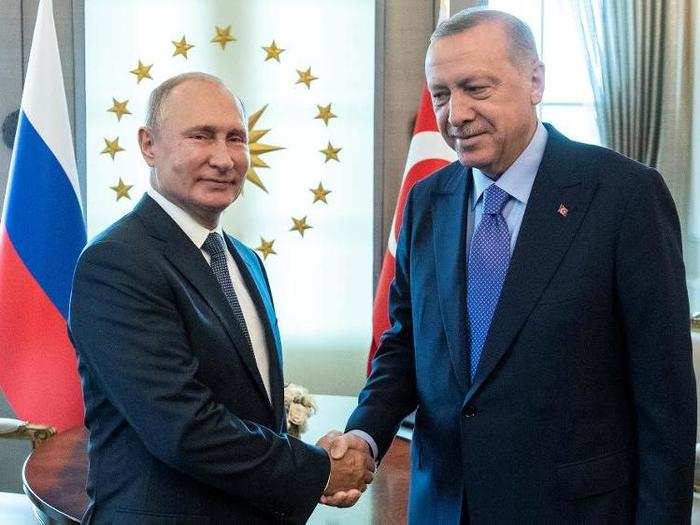
Putin has emerged in the agreement as one of the main power brokers in the fate of Syria's future, taking over the role the US once held.
The agreement between Putin and Erdogan may seem surprising, given that Russia backed the Syrian president Bashar al-Assad and Turkey supported rebel groups fighting against the regime.
But the agreement between the two world powers strengthens their influence in Syria as the country tries to rebound after years of civil war.
According to CNN, Putin said Ankara and Moscow have agreed to respect Syria's "sovereignty and territorial integrity," which can be framed as a successful foreign policy move by Russia.
Analysts told The Washington Post that the deal also helps Russia's ally, Assad, in regaining control over more of the fragmented country.
Assad also "expressed his full support" for the deal, the Kremlin said, according to the BBC.

The biggest winner in this deal is Erdogan's Turkey, which considers Kurdish forces in Syria to be a threat because of their association with the Kurdistan Workers Party, the PKK, which has long fought an armed conflict for independence against Turkey.
Turkey has previously expressed concern that the US was arming its long-standing enemy. Erdogan successfully pushed Trump to pull out the remaining US troops in the region during a phone call earlier this month.
When Trump announced the withdrawal of the remaining US troops, Turkey waged a brutal offensive against Kurdish forces in Syria.
Turkey has also been able to expand a buffer zone along its border, which Erdogan has said will be used to resettle more than 1 million Syrian refugees displaced by the war.
In effect, Turkey has been able to get exactly what it wanted in terms of securing a "safe zone" along its border, while also skirting US sanctions threatened but later withdrawn by President Donald Trump last week.
Turkey and the US agreed to a 5-day ceasefire on October 17, with the US agreeing not to pursue further sanctions in exchange.

Though the Kurds have yet to explicitly agree to the deal, they are left with a difficult decision: Fight an intensifying assault from Turkey, or concede defeat and give up land they now control.
Beyond the area along the Turkish border, the Russian-Turkish agreement also demands the YPG to withdraw from the towns of Manbij and Tal Rifaat, which lay outside of the agreed "safe zone."
According to The Wall Street Journal, Mazloum Abdi, the head of the Kurdish-led Syrian Democratic Forces (SDF), wrote in a letter to Vice President Mike Pence on Tuesday that the SDF had completed their withdrawal from the Turkish "safe zone," though neither the Kurds nor Turkey has officially confirmed this information.
A senior US official told the Journal that the agreement between Turkey and Russia meant that Turkey was entitled to use force against the Kurds if they are discovered inside the "safe zone."
"If the Turks can find any inside the safe zone ... the Turks will either let us know or they will shoot them."

The deal has shown that the US has essentially forfeited its clout in the region, as Turkey and Russia conduct negotiations amongst themselves.
Though the US has not given a clear deadline for the withdrawal of its troops, the deal solidified that it is now beyond the US to make these kind of decisions.
As the ceasefire agreement between the US and Turkey was set to expire, Sergei Shoigu, Russia's defense minister, suggested on Tuesday evening that the US had "one hour and 31 minutes left" to exit Syria, CNN said.
A senior US official told The Wall Street Journal that the Trump administration was still reviewing options for leaving troops in Syria, though US Secretary of Defense Mark Esper told reporters on Saturday that most US troops in Syria will soon be moved to neighboring Iraq to prevent a resurgence by the Islamic State.
Russian troops have already entered the region and have begun to take over US military bases.
"Humiliation doesn't begin to cover what the US forces are feeling right now," one coalition military official told Business Insider.
 Top temples to visit in India you must visit atleast once in a lifetime
Top temples to visit in India you must visit atleast once in a lifetime
 Top 10 adventure sports across India: Where to experience them in 2024
Top 10 adventure sports across India: Where to experience them in 2024
 Market recap: Valuation of 6 of top 10 firms declines by Rs 68,417 cr; Airtel biggest laggard
Market recap: Valuation of 6 of top 10 firms declines by Rs 68,417 cr; Airtel biggest laggard

Copyright © 2024. Times Internet Limited. All rights reserved.For reprint rights. Times Syndication Service.